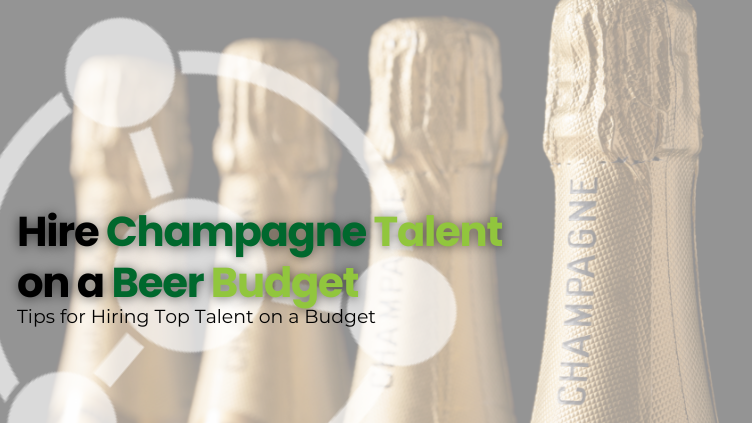
Hiring Champagne Talent on a Beer Budget
Tips for Hiring Top Talent
You get what you pay for.
Isn’t that the truth? Sure, we’ve all scored a deal here or there (like when your neighbor moves and offers you his nearly new Peleton for cheap), but by and large, haven’t we all learned this lesson the hard way at some point in our lives? How about that sweet Honda Accord you got in college for such a good steal down at Fast Fred’s car lot (that you promptly discovered needed a new transmission)?
You really do get with you pay for.
How does all of this work when you’re hiring? And what happens when you save money on the wrong hire, instead of spending money on the right hire?
A few significant things to note:
- Your organization is poised to lose upwards of ½ a million dollars on the wrong hire
- Your team suffers morale & productivity losses that are even more costly
- Your reputation takes a nose dive
So how do you allocate resources to ensure you get the right hire, without breaking your employer’s bank?
1. Consider hiring on potential, rather than experience.
Companies who do this well, benefit in spades over the long run. They seek out those who possess the intangibles (like grit, curiosity, resiliency) and then teach the actual skills, all the while cultivating a strong sense of loyalty on both sides. Hiring someone light on experience, that you’re able & willing to train, frees you up to re-allocate those dollars for something (or someone) else (maybe a higher profile, turnkey need, like a VA National Accounts rep). If you do this, make absolute certain that you (or whoever is doing the training) has the bandwidth to invest into this person, otherwise you’ll set them (& you) up for failure.
2. Partner with a strong recruiting firm.
If you’re going on a 10 day Alaskan fishing trip, your wife is going to expect a FedEx delivery on day 12, including a year’s worth of vacuum sealed salmon & halibut, will she not? So when you ask yourself:“Should I use a professional fishing guide to help me navigate this unfamiliar territory, or should I save a few bucks and wing it?” I think the answer is pretty obvious. Your time, energy & resources are limited, and you can’t take a risk when it comes to your ROI. Identifying, attracting & onboarding talent is really no different. Recruiting is probably not your gift. Leading a team is. Know your gifts. Strong recruiters know the job market, like really know it. They know where to look, how to look and they’ll do it faster & better than you. Plus, they’ll boost your employer brand in a way that makes your marketing team proud. When you partner with a strong recruiting firm, yes – you will make an initial investment that may seem expensive, sort of like the fishing guide. But the benefit you’ll get will far exceed their fee.
3. Play with the numbers.
Depending on the size of your organization, you may have some clout in how the compensation plan is structured. Lowering the base and increasing the commission percentages is a common way of doing this. Or the reverse, depending on what type of person you’re seeking and what you suspect may be the problem. For sales roles, it may be a win/win if you lower the base and then offer a much higher upside on commissions. We’ve certainly seen some of the bigger players do this very well (think Stryker). In the past, their reps have been some of the highest earners in the industry, but interestingly enough with some of the notoriously lowest bases. They key is, you need to make sure the base covers essential living expenses but isn’t so high as to demotivate them from selling; and also to ensure the commission thresholds are realistic & attainable, otherwise you’ll have a whole other problem on your hands.
4. Play up non-monetary gains.
If there was ever a time that people were making important career decisions driven by non-monetary gains, it would be now. And interestingly enough, according to Gallup, once a person’s income exceeds about $100k, more money does not equal more satisfaction. Beyond money, what people are really after varies depending on the demographic in question – but across studies, the common denominator was flex-time: Companies who offer flex time arrangements for their employees (some even with unlimited vacation time) are raising up happier employees, who in turn, are more accountable for their work and have a stronger sense of pride & responsibility. And according to Glassdoor,a company’s culture & values actually rank higher (22% vs. 12%) when it comes to predictors of employee satisfaction. How does this translate for you when trying to bring someone on board? Be sure that your employer brand is being authentically communicated at every touch point throughout the process. Candidates are savvy, and they are looking for transparency. Secondly, offer as much autonomy to your people as appropriate, then let them blow your mind.
Are you in the process of trying to land a diamond in the rough, planning a nationwide expansion or just looking to quickly find top talent for your team? Contact us today to discuss all your talent solutions needs. We are eager to help you improve lives by uniting great people with your great company!




